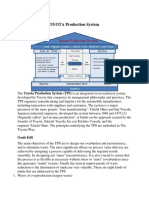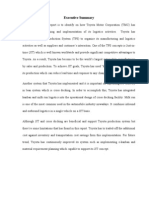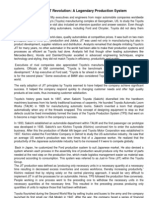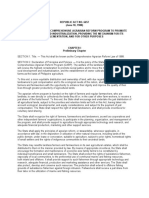Toyota Production System: TPS Manufacturing Waste Nampachi Hayashi TPS Waste
Uploaded by
abcdei cruzToyota Production System: TPS Manufacturing Waste Nampachi Hayashi TPS Waste
Uploaded by
abcdei cruzToyota Production System
The Toyota Production System (TPS) is an integrated socio-technical system developed by
Toyota (automotive manufacturer) to efficiently organize manufacturing and logistics,
including the interaction with suppliers and customers, to minimize cost and waste. Nampachi
Hayashi claims that TPS should have been called “Toyota Process Development System.”
The philosophy is to work intelligently and eliminate waste so that only minimal inventory is
needed. This increases cash flow and reduces physical space needs, and makes it easier to deliver
the required results smoothly through internal processes one piece at a time (single piece flow) to
the end customer.
The system is also known by the more generic “lean manufacturing” and “just-in-time
production” or “JIT Manufacturing.”
This system, more than any other aspect of the company, is responsible for having made Toyota
the company it is today. Toyota has long been recognized as a leader in the
automotive manufacturing and production industry. In the early 1950s, the company faced near
bankruptcy. After that major event that transformed the company, they have recorded steady
sales and market-share growth, with hardly any years that have not been profitable.
The majority of the system was originally developed beginning in 1948 through 1975, with
major influences from Taiichi Ohno, Eiji Toyoda, and Shigeo Shingo.
You might also like
- Case Study A Profile of Toyota's Production System0% (1)Case Study A Profile of Toyota's Production System1 page
- Strategic Management: International Strategy Case Study "Toyota"100% (1)Strategic Management: International Strategy Case Study "Toyota"10 pages
- Toyotas JIT Revolution A Legendary Production SystemNo ratings yetToyotas JIT Revolution A Legendary Production System7 pages
- Toyota Production System: TPS Manufacturing Waste Nampachi Hayashi TPS WasteNo ratings yetToyota Production System: TPS Manufacturing Waste Nampachi Hayashi TPS Waste1 page
- History of Lean Production, The Toyota Production SystemNo ratings yetHistory of Lean Production, The Toyota Production System2 pages
- Service Level Quality - Standards, Measures, Monitoring & Enhancing-An Overview. OF Lean Manufacturing ToyotaNo ratings yetService Level Quality - Standards, Measures, Monitoring & Enhancing-An Overview. OF Lean Manufacturing Toyota15 pages
- Toyota Production System: TPS Manufacturing Waste Nampachi Hayashi TPS WasteNo ratings yetToyota Production System: TPS Manufacturing Waste Nampachi Hayashi TPS Waste5 pages
- Lean Manufacturing in Toyota Motor CorporationNo ratings yetLean Manufacturing in Toyota Motor Corporation8 pages
- Case Study A Profile of Toyota's Production SystemNo ratings yetCase Study A Profile of Toyota's Production System1 page
- Toyota Is A Leading Brand Which Provides Its Customer Great Satisfaction Thorough Its ProductNo ratings yetToyota Is A Leading Brand Which Provides Its Customer Great Satisfaction Thorough Its Product1 page
- Toyota Production System - Lean Manufacturing and Six Sigma DefinitionsNo ratings yetToyota Production System - Lean Manufacturing and Six Sigma Definitions6 pages
- The Toyota Way:: 14 Management Principles BY Jeffrey K.LikerNo ratings yetThe Toyota Way:: 14 Management Principles BY Jeffrey K.Liker17 pages
- The Guidebook to Toyota's 13 Pillars System - Series Books 7 to 17: Toyota Production System ConceptsFrom EverandThe Guidebook to Toyota's 13 Pillars System - Series Books 7 to 17: Toyota Production System ConceptsNo ratings yet
- Making Things: The Essence and Evolution of The Toyota Production SystemNo ratings yetMaking Things: The Essence and Evolution of The Toyota Production System2 pages
- A Case Study ON Toyota Production SystemNo ratings yetA Case Study ON Toyota Production System20 pages
- Understanding the Toyota Production System's Genetics: Toyota Production System ConceptsFrom EverandUnderstanding the Toyota Production System's Genetics: Toyota Production System Concepts5/5 (1)
- A Complete Guide to Just-in-Time Production: Inside Toyota's MindFrom EverandA Complete Guide to Just-in-Time Production: Inside Toyota's Mind5/5 (4)
- A New Twist On Rehabilitation Services: 1980sNo ratings yetA New Twist On Rehabilitation Services: 1980s1 page
- Comprehensive Agrarian Reform Law of 1988.No ratings yetComprehensive Agrarian Reform Law of 1988.2 pages
- A New Twist On Rehabilitation Services: 1980sNo ratings yetA New Twist On Rehabilitation Services: 1980s3 pages
- Toyota Production System: TPS Manufacturing Waste Nampachi Hayashi TPS WasteNo ratings yetToyota Production System: TPS Manufacturing Waste Nampachi Hayashi TPS Waste2 pages
- Queuing Theory and Models: Management ScienceNo ratings yetQueuing Theory and Models: Management Science8 pages
- Categories of Nonverbal Communication: KinesicsNo ratings yetCategories of Nonverbal Communication: Kinesics2 pages
- A New Twist On Rehabilitation Services: 1980sNo ratings yetA New Twist On Rehabilitation Services: 1980s12 pages
- Choose From The 10 Commandments of Philosophy Introduced by Bertrand Russell. Then Explain Each ProfoundlyNo ratings yetChoose From The 10 Commandments of Philosophy Introduced by Bertrand Russell. Then Explain Each Profoundly1 page
- Queuing Theory and Models: Management ScienceNo ratings yetQueuing Theory and Models: Management Science8 pages












































































